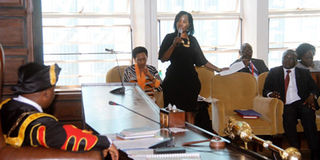Division mayors, Lukwago lock horns over new budget

On duty. KCCA executive director Jennifer Musisi (standing) makes a point during one of the meetings at City Hall recently. FILE PHOTO
What you need to know:
- Before Kampala City Council (KCC) rebranded to become KCCA in 2010 and placed under the Office of the President, city divisions used to enjoy semi-autonomy, but critics claimed that this was characterised by corruption and massive abuse of office.
- KCC was removed through enacting the KCCA Act, 2010 that was promulgated on December 28, 2010 and came into force on January 14, 2011. It centralised all powers into the hands of the executive Director. This saw all accounts of the former KCC frozen and a single vote created to manage all the five city divisions.
KAMPALA. City divisional mayors have accused Kampala Capital City Authority (KCCA) political and technical teams of sidelining them during the formulation of the 2018/2019 city budget.
The mayors accuse the technical team headed by Ms Jennifer Musisi and the Lord Mayor’s office led by Mr Erias Lukwago of ignoring their demands and aspirations. They have always demanded for an independent budget for every division.
The demand was championed by Kampala Central Division and picked momentum with the backing of the other four divisions of Makindye, Rubaga, Kawempe and Nakawa.
The demand is hinged on the accusation that the KCCA administrative setting allows urban councils to only identify priority areas for budget allocation, and not participate in the budgeting process, something they claim makes them idle and leads to wastage of tax payer’s money they receive in salaries.
The budget estimates
KCCA’s Medium Term Expenditure Framework (MTEF) allocation for 2018/19, a copy which Daily Monitor has seen, is estimated at Shs458.33 billion.
The difference in figures from Financial Year 2017/18 arises from the increased allocation for the second Kampala Institutional Infrastructural Development Project (KIIDP-2) from Shs31 billion to Shs158 billion.
In the 2017/18 budget, KCCA was allocated Shs337 billion against their estimate of Shs1 trillion.
The budget estimates for the Financial Year 2018/2019 were reportedly prepared on November 13, 2017 and submitted to government without the city mayors’ input.
The division mayors have now branded KCCA’s top leadership as “selfish”.
According to Mr Emmanuel Sserunjogi, the chairperson of Kampala divisional mayors, they sat in a series of meetings with Mr Lukwago and agreed that their views be incorporated into the budget right from parish to the district level, “but all this was ignored”.
Budget conferences
“Under normal circumstances, the budget process starts with conferences from the various parishes to the division council up to the Authority. But what we saw on November 13 was against our principal agreement and standards. We do not know why the Lord Mayor’s office decided to deviate from what we agreed upon. The budget framework was passed without quorum because some authority councillors refused to attend since their issues had not been considered,” Mr Sserunjogi says.
“The conclusion we have now is that those people fear to share power. They want to do everything by themselves, but this affects service delivery in terms of prioritisation,” he adds.
“Decisions must be taken by us as divisional mayors who stay among poor city dwellers because we understand their problems and not by those who stay in upscale Kampala,” Mr Sserunjogi says.
Mr Kasirye Nganda Mulyanyama, the mayor for Makindye Division argues that centralising power has led to stagnation of service delivery at the division level.
“I have many impassable roads and households infested with bedbugs. However, I can not do anything about them because priorities are made from the centre an City Hall,” Mr Mulyanyama says.
Partnerships
Previously, Mr Mulyanyama says, divisional mayors could create partnerships with their counterparts abroad and fundraise for their divisions, but this can no longer happen under the current KCCA arrangement.
“When it is time to implement a project, the people who must sign the cheques are at City Hall. We want to manage our accounts and this means our division town clerks should be empowered,” he adds.
Mr Ahmed Ntare, the deputy mayor of Rubaga Division questions the essence of decentralisation if power is only concentrated at City Hall.
Recently, divisional mayors met the Parliamentary Committee on Presidential Affairs and demanded that powers be devolved.
However, the deputy Lord Mayor, Ms Sarah Kanyike, explains that the budget framework which was passed hurriedly is not final.
“We had been caught up by the deadline, so we had to send something to government. We will sit with the councillors and all divisional mayors to make a final budget for the city,” Ms Kanyike says.
There was no time
She is backed by the KCCA ccting director of Treasury services, Mr Julius Kabugo, who says they had no option but to submit the budget framework to the Ministry of Finance because there was no time.
“This is not the final budget. Before it is passed in Parliament, mayors’ input will be included. Also, their demands are being addressed,” he says.
Ms Beti Olive Kamya, the Minister for Kampala Metropolitan Affairs, says: “It is true the city divisions want autonomy but we could not work on it since we were running out of time. However, the mayors boycotted the budget process and that is why their input was not captured. But this is not the final budget process.”
But the KCCA spokesperson, Mr Peter Kaujju, says the executive cannot antagonise the devolution of power to the city divisions.
“What I know is that there is a committee working on an instrument to enable devolution of power to the divisions. I think that process will be completed soon,” Kaujju says.



